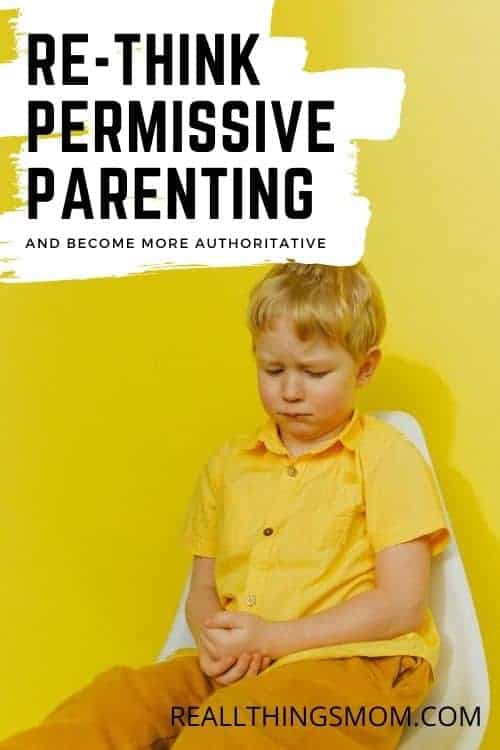
It’s time to have the talk about permissive parenting. Don’t worry! I’m not here to scold you like a mother-in-law about your parenting style! But I do want to help! Permissive parenting is a real problem—for kids, for parents, and for other people who have to deal with kids from a permissive home. Permissive parenting is the direct effect of the ever-extreme pendulum swing. The pendulum of social norms always swings from one extreme end to the other. Permissive parenting is a direct result of a rebellion against authoritarian parenting (you know, the children should be seen and not heard model).
But permissive parenting, like authoritarian parenting, is not healthy. It is actually damaging to your child emotionally, mentally, and even physically. Studies have shown that children from permissive parents not only have more behavioral problems, but also health and dental problems. They have no healthy limits for screen time or junk food, which affects the brain, body, and teeth negatively.
Usually, there are a couple of reasons that parents are permissive. The first is that they don’t know better. Maybe they had permissive parents of their own and haven’t had any other example. Or perhaps they have gone to the other extreme after growing up with an authoritarian parent. There is also a bit of pressure sometimes from society to be permissive!
There is a balance that needs to be struck between authoritarian parenting and permissive parenting. This parenting style is called authoritative. This is the balance we all need to be working toward so if you’d like to do more research, there are many resources to help! (This is one of my favorites to get you started!)
If you are a permissive parent, please hear me out! I want to help you learn to set limits and enforce them, but it is not to make you feel like you’re doing it all wrong!
Three Things Permissive Parents Do Well:
- They allow their child to make choices for themselves—Your child needs to do this in moderation! There are choices your child can make for himself that are healthy and don’t need to have consequences (Jimmy, would you like to wear the red shirt, or the black shirt today?). A child dressing in stripes with polka dots rarely bothers permissive parents.
- They are very warm with affection—Usually, permissive parents have children who are affectionate. Permissive parents often tend to be coming from an anti-authoritarian point of view and want to be sure their children know how much they are loved. This is a good thing!
- They don’t sweat the small stuff—I used to practically have a panic-attack if my children did not take naps! Mostly, because they were so crabby for the rest of the day and I was miserable. However, whether or not they were crabby didn’t matter because I had already made up my mind that they would be miserable without a nap. This kind of thing would not even ruffle a permissive parent!
That being said, permissive parents are also exhausted! Having no rules in the home is exhausting because without them, children know no rules outside of the home. However, the kids are still expected to respect rules with which they have never been familiarized. Often, this brings judgement from others and it is discouraging. Meanwhile, chasing their children around and cleaning up the broken messes they leave behind is also exhausting! The other thing that permissive parents don’t tend to think about is that your two-year-old will be a teenager soon enough. A child who has never had a boundary enforced will not take very kindly to having it enforced as a teenager. And the stakes are much higher then!
Five Ways to Ditch Permissive Parenting to Be More Authoritative:
- Set boundaries—
I once read a story about a daycare. At the daycare, there was a huge backyard for the children to play in, but there was no fence. The yard was not near a street, so there was no danger in not having a fence, but the children always stayed in a little cluster near the house. Then, she put up a fence around the yard. After that, the children spread out, playing as near to the fence as they could. This illustrates that children need boundaries in order to feel safe! Children were never meant to be in charge. Instead, they need their parents to take charge so they can feel safe! Setting boundaries shows your child love by allowing her to feel safe.
- Stick to the boundaries—
There must be a consequence whenever a boundary is pushed, or broken. For example, you told your child he may not use the glue without your help. He dumped the glue all over the table. While you may just clean it up and not worry about it, he broke the rule. It’s not such a big deal right now; after all, he only poured it on the table, but what happens when he pours it on the head of the little girl who sits in front of him at school? Enforcing the boundaries when the issue is small could very well save you from visiting your son in jail further down the road, when the issue is big and someone else enforces the boundaries in your place!
- Be Strong, Mom!—
Your child isn’t going to like it when you start enforcing boundaries—GUARANTEED. But think of it as an investment—investing the effort now will save you time and effort in the long run. Also, I know how embarrassing it is to have your child throwing a tantrum in public, but when I see another child doing the same thing, it says to me, “That mom is enforcing rules!” and I would far rather see that than the mom who is giving her child the candy bar at the checkout because he or she is having a fit!
- Do not disrespect other people’s things or homes—
This is a tough one. We have had friendships that have had to be severed because of permissive parenting. It’s just too difficult to have children over who have no rules. One time, I had a friend whose son climbed up on our TV stand and started banging on our TV with a toy hammer while I listened to her say, “Ethan, do you think that is a wise choice?” Um…obviously he does or he wouldn’t be doing it!
- Watch and Learn—
You can learn a lot from watching other parents. You can learn what not to do (I have taught plenty of those lessons myself, I’m sure!) and you can learn what to do. If you’re struggling because you haven’t had a good example of a parent in your life, look for someone you trust and respect and ask her to help you! Sometimes, all it takes is someone to model it for you and there is absolutely no shame in that!
Permissive parenting does more damage than good. Children who don’t know boundaries really struggle sometimes in a world where boundaries are important. We’ve all seen the “Affluenza Teen.” I’d much rather be the mom with the toddler who is screaming because I said, “no” than the mom of the “Affluenza Teen!” Is it time to re-think your parenting style?
P.S. Get my FREE 12 Calm Responses to Tantrums Cheatsheet.
RElated: Why Children Need to Hear the Word, “No.”
